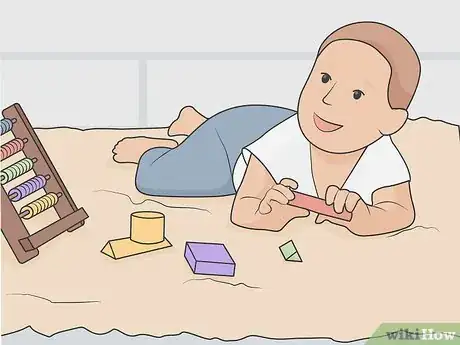This article was co-authored by wikiHow Staff. Our trained team of editors and researchers validate articles for accuracy and comprehensiveness. wikiHow's Content Management Team carefully monitors the work from our editorial staff to ensure that each article is backed by trusted research and meets our high quality standards.
This article has been viewed 17,324 times.
Learn more...
Tummy time is a crucial activity for your newborn’s development. It helps them to develop muscles in their neck and back that will eventually allow them to crawl and turn over. Tummy time also helps to prevent your baby’s head from developing a flat spot due to laying on their back for too long. As long as you have the okay from your baby’s pediatrician, you can start doing tummy time with your newborn as soon as you bring them home from the hospital.
Steps
Starting Tummy Time
-
1Wait until after a nap, and avoid tummy time after feedings. The best time to do tummy time is when your baby is alert and happy. Make sure they have a clean, dry diaper on, and try to do tummy time soon after your baby has woken up from a nap. Don’t do tummy time right after a feeding either since the pressure on baby’s tummy may increase the chances that they will spit up.[1]
- Timing your baby’s tummy time just right will help to reduce the chances that your baby will get upset or be uncomfortable during tummy time. However, keep in mind that some babies dislike tummy time in the beginning no matter what!
-
2Choose a firm, but soft space for your baby to safely lay down. A clean space on your living room floor, a plain sheet or on a baby play mat are good options for tummy time. You could also lay your baby down on their crib mattress or on your bed. Just make sure that the area is free of any hazards like wires, sharp objects, or anything small your baby could choke on if they put it on their mouth.[2]
- A carpeted space works best if placing your baby on the floor, but you may also place a baby blanket or rug down if you have hardwood or linoleum floors. Avoid thick blankets, as these could obstruct your baby's breathing.
Advertisement -
3Place your baby down gently and stay right beside them. Hold your baby so that they are facing down. Then, gently lower them onto the surface you're using for tummy time. Make sure your baby is on their tummy and their arms and legs are not underneath them. Sit or lie next to your baby on the floor after you put them down.[3]
Tip: If the weather is nice, you could even take your baby outside and do tummy time on a blanket or rug on the ground. Just make sure to stay right next to them the whole time.[4]
Making Tummy Time More Enjoyable
-
1Do tummy time 2-3 times a day for 3-5 minutes each time. Most babies are resistant to tummy time since it feels uncomfortable for them. Observe your baby to see how well they tolerate it and do not leave them on their tummy for more than 5 minutes at a time. Repeat the exercise 2 or 3 times daily depending on how well your baby tolerates it.[5]
- Plan on a morning session, such as after your baby wakes up, and an afternoon session, such as after your baby has had a nap.
Tip: Your goal is to gradually work up to about 15 to 30 minutes of total tummy time per day by the time your baby is 3 months old.
-
2Go slow and do less than 3 minutes per session if your baby dislikes it. You do not have to jump right into a 5-minute session if your baby does not like tummy time. It’s okay to start with just 1 minute and build from there.[6]
- For example, if your baby starts crying immediately and seems very uncomfortable, then pick them up after 1 minute and only do 2 sessions per day for the first few days. Then, increase the time to 2 minutes for 2 sessions for a few days, then 3 minutes for 2 sessions for a few days.
-
3Pat your baby on the back to let them know you are right there. Being on their tummy will probably be uncomfortable for your newborn at first. To help them feel more secure, make sure to stay right by their side and let them know you are with them. Talk to your baby, stroke their back, or let them hold onto your finger.[7]
- It is also a good idea to lay on the floor with your face next to your baby’s face so they can see you the whole time.[8]
-
4Play with your baby while they are doing tummy time. Playing with your baby during tummy time can help them to associate it with fun rather than thinking of it as a chore. Get out some of your baby’s favorite toys and arrange them in front of them so they will want to look up, which will exercise their muscles. Some other fun ways to play with your baby during tummy time include:[9]
- Flipping through the pages of a baby book with them and talk about the pictures.
- Placing a shatterproof mirror on the floor in front of your baby so they can see their reflection.
- Rolling a ball in front of them so they can see it.
Trying Different Positions
-
1Try holding your baby against your chest while you're laying on your back. An alternative to placing your baby on the floor is to place them on your chest while you are reclining. Lean back in a reclining chair, or on a sofa or bed propped up with pillows. Then, lay your baby on your chest so that their chest is against yours and they can look up to see your face.[10]
- Ensure that your upper body is at a 45-degree angle for this type of tummy time.
- This method works best in the first few weeks of your baby’s life, but you can continue to do this as your baby grows.
-
2Hold your baby face down on your lap to comfort them during tummy time. Sit in a sturdy chair or on a sofa, and lay your baby across your lap so they're perpendicular to your body. Make sure your baby's face isn't obscured by your legs and clothing, and hold their sides securely as they look around.[11]
- This is a great way to try tummy time in the first few weeks of a newborn's life.
-
3Carry your baby while they are facing down and show them things. If you want to do tummy time on the move, you can hold your baby so they are facing downwards. Cradle your baby’s body with your forearm and allow them to rest their head in the crook of your elbow. Use your other arm to stabilize your baby over your arm, such as by holding their side. Walk around your home or outside with your baby if the weather is nice.[12]
- Make sure your baby is facing away from your body so they can see the things that you show them.
- This option works great for your newborn and you can continue to do this as your baby grows.
-
4Use a nursing pillow or rolled up towel to prop up your baby’s chest. If your baby is having a hard time lifting up their upper body to look around, then you can place a nursing pillow or a rolled up towel under your baby’s chest. Aim to prop your baby up so their upper body is at a 45 degree angle.[13]
- Make sure that the nursing pillow or towel is not in your baby’s face or under their neck.
- This option works best when your baby has some experience with tummy time, such as after about 2 weeks.
Tip: Remember that no two babies are the same, so what works for one baby might not work for yours! Try out different tummy time positions to see what your baby likes best.
Warnings
- Never give your baby tummy time whilst they are asleep as this increases the risk of SIDS.⧼thumbs_response⧽
References
- ↑ https://www.thebump.com/a/tummy-time-when-to-start-how-to-do
- ↑ https://www.thebump.com/a/tummy-time-when-to-start-how-to-do
- ↑ https://www.mayoclinic.org/healthy-lifestyle/infant-and-toddler-health/expert-answers/tummy-time/faq-20057755
- ↑ https://www.pregnancybirthbaby.org.au/tummy-time
- ↑ https://www.mayoclinic.org/healthy-lifestyle/infant-and-toddler-health/expert-answers/tummy-time/faq-20057755
- ↑ https://www.thebump.com/a/tummy-time-when-to-start-how-to-do
- ↑ https://www.pregnancybirthbaby.org.au/tummy-time
- ↑ https://www.todaysparent.com/baby/baby-development/how-to-do-tummy-time-with-your-baby-8-fun-activities-to-try/
- ↑ https://www.pregnancybirthbaby.org.au/tummy-time
- ↑ https://www.todaysparent.com/baby/baby-development/how-to-do-tummy-time-with-your-baby-8-fun-activities-to-try/
- ↑ https://www.todaysparent.com/baby/baby-development/how-to-do-tummy-time-with-your-baby-8-fun-activities-to-try/
- ↑ https://www.todaysparent.com/baby/baby-development/how-to-do-tummy-time-with-your-baby-8-fun-activities-to-try/
- ↑ https://www.todaysparent.com/baby/baby-development/how-to-do-tummy-time-with-your-baby-8-fun-activities-to-try/






































































